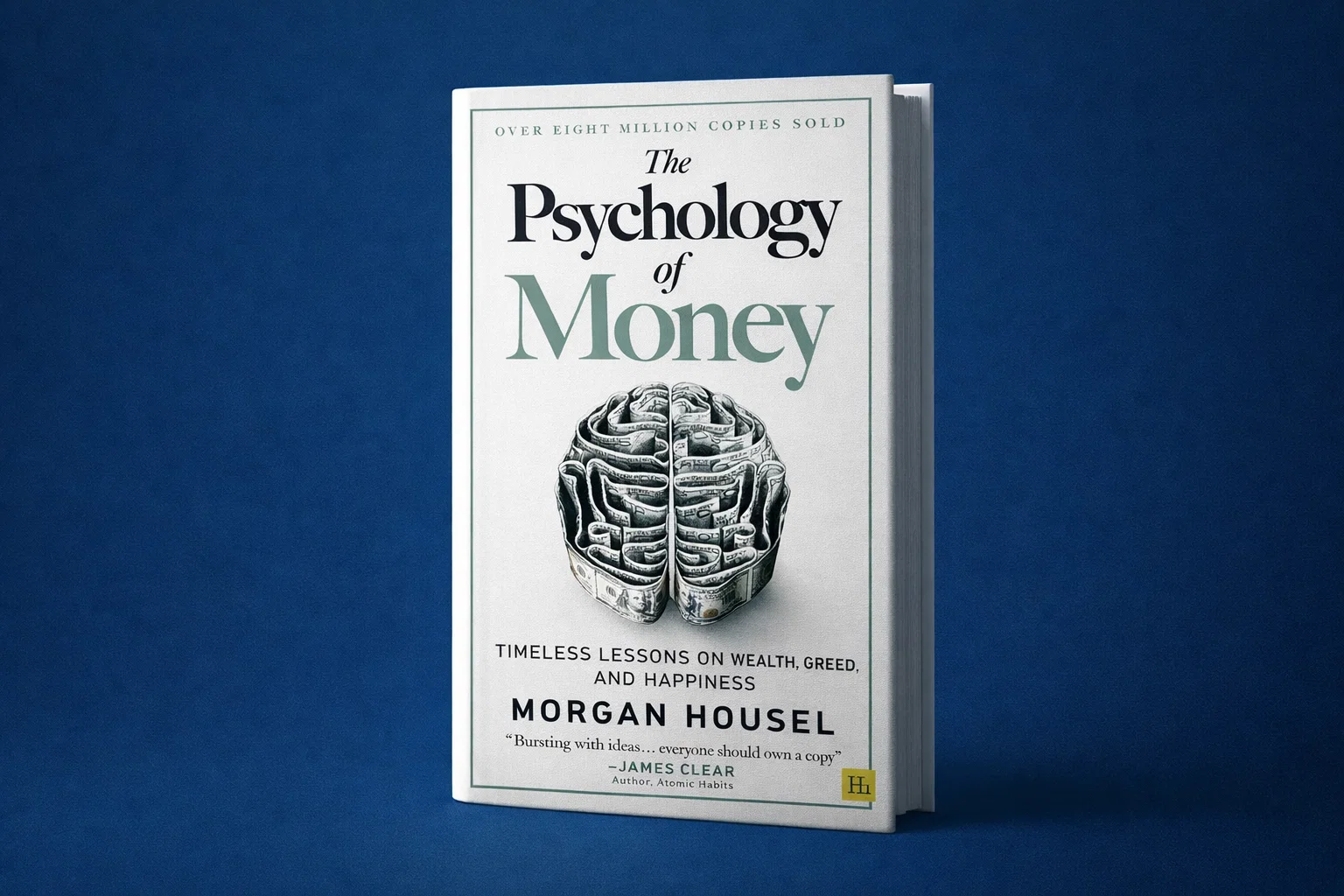The Psychology of Money

We’re often taught that doing well with money is about math. It’s about formulas, spreadsheets, and charts that tell us what to do. But when we look at the real world, it’s clear things are much more complicated. We see brilliant financial minds go broke and everyday people with no formal training build fortunes.
This points to a simple but profound truth: financial success is not a hard science. It’s a soft skill, where how you behave is more important than what you know. A genius who loses control of their emotions can be a financial disaster, while ordinary people can become wealthy if they master a few key behavioral skills.
These insights are drawn from Morgan Housel’s landmark book, The Psychology of Money, which argues that understanding our own behavior—our flaws, biases, and emotional triggers—is more important than the technical side of money. This article will explore five of the most impactful and counter-intuitive lessons from the book that can help us make better financial decisions. Understanding the psychology of money is the first step toward mastering the inner game of wealth.
1. Getting Wealthy Requires Taking Risks. Staying Wealthy Requires the Opposite.
Getting money and keeping money are two distinct skills. The first often requires optimism, putting yourself out there, and taking risks. The second, however, requires the opposite: humility and a healthy fear that what you’ve made can be taken away just as quickly. It requires an understanding that past success is no guarantee of future results.
Legendary stock trader Jesse Livermore was a master at getting wealthy. During the stock market crash of 1929, he made the equivalent of $3 billion by taking massive, risky bets that stocks would fall. But the same risk-taking that built his fortune also destroyed it. He continued making larger and larger bets until he eventually lost everything and took his own life.
Livermore’s story contrasts with that of Rick Guerin, an early partner of Warren Buffett and Charlie Munger. Guerin was just as smart as his famous partners, but as Buffett explained, he was “in a hurry.” In the downturn of 1973–1974, Guerin was heavily leveraged with margin loans. When the market crashed, he got margin calls and was forced to sell his Berkshire Hathaway stock to Buffett for less than $40 a share. While Buffett and Munger built their fortunes by surviving, Guerin was wiped out. Both Livermore and Guerin were brilliant at getting rich, but terrible at staying rich.
The most important skill in finance is survival. Sticking around long enough for your assets to compound is what builds real, lasting wealth. This requires a mindset of paranoia—avoiding ruin at all costs. As Warren Buffett famously said about traders who lost everything by chasing more:
To make money they didn’t have and didn’t need, they risked what they did have and did need. And that’s foolish. It is just plain foolish. If you risk something that is important to you for something that is unimportant to you, it just does not make any sense.
2. The True Value of Wealth is Autonomy.
The greatest intrinsic value of money is its ability to give you control over your time. It is the power to wake up in the morning and say, “I can do whatever I want today.” This ability—to do what you want, when you want, with who you want, for as long as you want—is the highest dividend money pays.
This isn’t just a feel-good idea; it’s backed by research. Psychologist Angus Campbell, in his book The Sense of Wellbeing in America, found that having a strong sense of control over one’s life was the most dependable predictor of happiness.
Having a strong sense of controlling one’s life is a more dependable predictor of positive feelings of wellbeing than any of the objective conditions of life we have considered.
In today’s world, this form of wealth is more important than ever. Unlike a factory worker of the past who could leave their tools at the factory, the modern knowledge worker’s “tool is your head, which never leaves you.” We may be richer on average, but we often feel like we’re working 24/7, diminishing our sense of control and happiness. Using your money to buy time and options has a lifestyle benefit few luxury goods can compete with.
3. Wealth Is What You Don’t See.
We tend to judge wealth by what we see: cars, homes, Instagram photos. But this introduces a fundamental paradox. Rich is a current income. Someone driving a $100,000 car is almost certainly rich, because you need a certain level of income to afford it. But wealth is hidden. It’s income not spent. Wealth is the nice car not purchased, the diamond not bought, the first-class upgrade declined. It’s the financial assets that haven’t yet been converted into the stuff you see.
Housel recounts his time working as a valet in Los Angeles, where he saw countless people who looked rich but may not have been wealthy. A young man he calls Roger drove a Porsche, but one day showed up in an old Honda. The Porsche, it turned out, had been repossessed. This experience led to the “Man in the Car Paradox”: when we see someone driving a nice car, we rarely think, “Wow, that person is cool.” Instead, we think, “Wow, if I had that car, people would think I’m cool.” We use their apparent wealth as a benchmark for our own desire to be liked and admired.
The desire for respect is often misplaced in expensive items. After nearly going bankrupt from overspending, the singer Rihanna sued her financial advisor. His firm responded:
“Was it really necessary to tell her that if you spend money on things, you will end up with the things and not the money?”
The world is full of people who look modest but are wealthy, and people who look rich but are living on the razor’s edge of insolvency. Understanding this distinction is a fundamental concept in the psychology of money. Real wealth is about having assets in the bank, not showcasing them on the driveway.
4. The Social Comparison Game is a Battle You Can Never Win.
At a party hosted by a billionaire, author Kurt Vonnegut remarked to his friend Joseph Heller that their host had made more money in a single day than Heller had earned from his classic novel Catch-22 in its entire history. Heller’s response was profound.
“Yes, but I have something he will never have … enough.”
The modern world is exceptionally good at generating two things: wealth and envy. The “taste of having more”—more money, more power, more prestige—often increases ambition faster than satisfaction. This pushes the goalpost of “enough” further and further away, trapping you in a cycle of wanting more. This danger is fueled by social comparison, a game where the ceiling is so high that no one can ever hit it.
This lack of “enough” is what drove already successful and unimaginably wealthy men like Rajat Gupta and Bernie Madoff to risk everything for more. Gupta, a former McKinsey CEO worth $100 million, went to prison for insider trading in a quest to become a billionaire. Madoff ran a legitimate and highly profitable business, yet threw it all away on a Ponzi scheme. They risked what they had and needed for what they didn’t have and didn’t need.
The hardest financial skill is getting the goalpost to stop moving. You have to learn what “enough” means for you. The only way to win the social comparison game is to refuse to play it in the first place.
5. Acknowledge the Powerful Roles of Luck and Risk.
When Nobel Prize-winning economist Robert Shiller was once asked what he most wanted to know about investing that we can’t know, he replied, “The exact role of luck in successful outcomes.” Luck and risk are siblings; they are both the reality that outcomes in our lives are guided by forces outside of our individual control. For every great success, there is often a story of great luck, and for every failure, a story of devastating risk.
The story of Bill Gates and his high school friend Kent Evans is a powerful illustration. Gates had one-in-a-million luck. He attended one of the only high schools in the world in 1968 that had a computer, giving him a head start that he himself admits was essential to Microsoft’s founding. Kent Evans was his best friend, equally smart, equally driven, and shared the same passion for computers. But Evans experienced one-in-a-million risk: he died in a mountaineering accident before graduating high school. They were two brilliant minds on the same path, but luck and risk sent them in opposite directions.
Because it’s hard to quantify luck and often rude to suggest someone’s success is owed to it, we tend to ignore it. This is dangerous. It leads us to try to emulate extreme successes—like those of billionaires and star CEOs—that are often the least applicable to our own lives because their outcomes were so heavily influenced by luck.
Instead of focusing on specific individuals, we should focus on broad patterns. The key insight is to recognize, as NYU professor Scott Galloway says, that “Nothing is as good or as bad as it seems.”
Conclusion: Mastering the Inner Game of Wealth
Our relationship with money is driven more by psychology than by spreadsheets. Getting wealthy and staying wealthy are different skills; the true value of money is control over your time; real wealth is what you don’t see; the goalpost of “enough” must stop moving; and luck and risk play a bigger role than we admit.
Understanding these behavioral patterns is the first step toward making better financial decisions. The real mastery of money isn’t about complex strategies or picking the next hot stock. It’s about mastering our own egos, expectations, and emotions, which is more important than the technical side of money.
Morgan Housel is a celebrated financial writer, investor, and partner at The Collaborative Fund, a firm that supports startups. He previously worked as a columnist for The Motley Fool and The Wall Street Journal, earning multiple awards for his business and finance journalism, including the Best in Business Award, the New York Times Sidney Award, and two Gerald Loeb Award finalist nominations. Housel is the author of The Psychology of Money: Timeless Lessons on Wealth, Greed, and Happiness, a book based on over a decade of writing about finance and personal experience navigating financial markets, including during the 2008 crisis. Before fully focusing on writing and investing, he started his career as a stock picker and later shifted to low-cost index funds for his own investments.
Book details
- Title: The Psychology of Money
- Explanatory Title: Timeless lessons on wealth, greed, and happiness
- Author: Morgan Housel
- Publisher: Harriman House
- Publication Date: September 8, 2020
- Print Length: 256 pages
- ISBN-10: 0857197681
- ISBN-13: 978-0857197689
- Category: Budgeting & Money Management / Introduction to Investing

